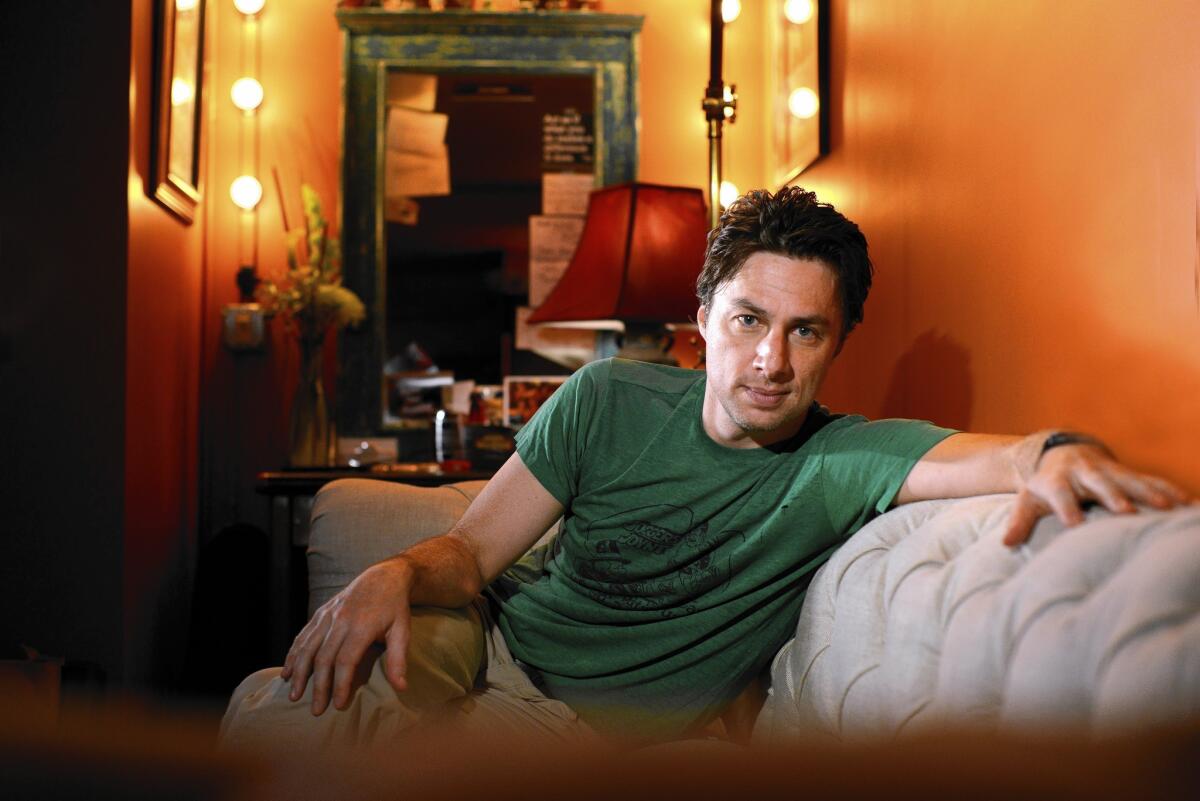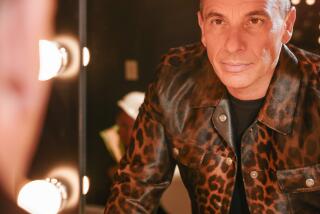Zach Braff moves on to a parental state in ‘Wish I Was Here’

Reporting from New York — Zach Braff is looking a little exhausted. He has good reason to.
For the last few months Braff has been going all out six days a week on the New York stage as the lead in “Bullets Over Broadway” — while, on his day off, flying to cities around the country for Q&A’s at early screenings of his new poignant comedy, “Wish I Was Here,” which arrives in theaters Friday. He directed, produced, co-wrote and stars in the movie, whose roughly $6-million budget he raised on Kickstarter and helped pay for himself.
“You couldn’t put more on the line than I’ve put on the line with this movie,” the filmmaker said last week, sipping an espresso on the roof deck of a restaurant a few blocks from his New York apartment. “I’ve micromanaged every single frame of this, literally and figuratively.”
Big, bold statements aren’t new for Braff, who with a sharp intelligence and occasionally contentious manner comes off somewhat at odds with the naive goofball of his most famous role, as the newbie doctor John Dorian on “Scrubs.” The 39-year-old has strong opinions and is not shy about expressing them — he is prone, for instance, to telling reporters what he thinks is wrong with entertainment journalism — but has a surprisingly clear-eyed view of his place in the Hollywood firmament.
His new movie is likely to cement that place, solidifying for his not insignificant fan base (nearly 47,000 of whom kicked in money so he could make this movie) why they like him, and reminding his critics why they don’t.
“Wish I Was Here,” which Braff co-wrote with his brother Adam, is an often funny, unself-consciously sentimental look at what happens when Aidan (Braff), a 35-year-old father of two, must pull his kids out of their Jewish day school because his father (Mandy Patinkin), who had been funding the enterprise, has taken ill and needs his money for an experimental procedure.
Aidan, a struggling actor who Braff says is in part channeling his own early-20s Hollywood slump, decides to home-school his kids. The plot turn is an opportunity for Braff to indulge his inner child while facing the kind of existential crossroads that the lead character in his debut “Garden State” did a decade earlier at a different life stage.
”I think there’s a common theme in both movies of characters realizing that all we have, if we’re lucky, is 90 some-odd years on this planet, and both of them are wrestling with, ‘Am I making the most of this brief, bizarre period,’” Braff said. “‘Garden State’ was about the power of romantic love in that question. This is about a man realizing the power of familial love.”
With a tone that can veer between ruminative and farcical, and a signature mix of goofy comedy and softhearted emotion, “Wish I Was Here” tries some things rarely seen on film. It goes for the emotional jugular with deathbed and hospital scenes while attempting plenty of broad comedy (think Comic-Con cosplay sex), and beauty shots of Joshua Tree. Melancholy music is deployed early and often from the likes of the Shins, Bon Iver, Coldplay and the suitably named the Weepies.
The film also is eager to look at spirituality, offering conversations between Aidan, his kids and their teachers about Orthodox Judaism, a choice that Braff says gave traditional film financiers plenty of pause.
Braff said he decided to incorporate these questions because he got to a point in his life where, like other secular contemporaries he knew, he felt like he was looking for meaning but had rejected the organized religion of his parents and grandparents. (Adam Braff, 10 years older than Zach and unlike Zach, a father to young children himself, supplied the parental-angst parts).
And though the struggling-actor story line may seem a world away for someone who was long ago able to cash in on sitcom syndication money, Zach Braff said the part hits close to home.
“I was really close to giving up,” he said of the years after he graduated from Northwestern University but before he was cast on “Scrubs” at 26. “I was waiting tables at Le Colonial at Beverly and Robertson in a tunic at this French Vietnamese restaurant. I had a movie called ‘Broken Hearts Club’ at the Sunset 5 up the street. People would say, ‘We just saw your movie.’ And I’d say, ‘Oh thank you. Let me tell you about our specials.’”
“Wish I Was Here” has had a potent effect on many viewers who at a Sundance screening and a word-of-mouth showing were doing plenty of laughing and crying.
But like Braff himself, the film is also unexpectedly polarizing. It has engendered criticism that it is manipulative and overly sentimental. Braff’s pop-philosophical inquiries, beloved by some, generate eye-rolling in others.
Braff’s popularity is itself a strange thing. He has managed to distinguish himself from most other sitcom stars of his generation by taking the creative reins. “Garden State” became a surprise indie sensation, grossing $27 million and defining the zeitgeist. He has recently played in other sandboxes too, writing several off-Broadway plays and starring in “Bullets.”
But in doing so he also seems to irk some people.
”Listen, I know at this point what I do is polarizing. I think people like me or they don’t,” he said. “I’m a very sensitive person. I write things that are, yes, very sentimental and my humor is broad at times, but that’s taste. It’s no different than when a guy pulls up next to me at a light and he’s blasting house music that he loves so much and I have to close my window because I think, ‘This is horrible.’”
Asked why he thought some had such strong reactions to him, he said, “We’re living in a very cynical world. I love to cry in a movie. I love the feeling I have when tears are streaming down my face and I’ve just laughed. That’s my favorite experience. If it’s not someone else’s that’s fine; go watch something else. There’s plenty of fare.”
Whatever one’s feelings on his sensibility, it would be hard to deny what he’s achieved in getting to this point. At a career stage when most actors basically cross their fingers for the right director to come calling, Braff has made a deeply personal film with almost no traditional financing and then set out tirelessly to get people to see it.
At a Kickstarter screening at the ArcLight’s Cinerama Dome in Los Angeles several weeks ago, he worked the room expertly, taking time to answer fan questions thoughtfully and with a well-placed quip. He seems to tweet every third minute too.
Braff says if there’s any lesson from “Wish,” it’s not about Kickstarter — he says this was an experiment and he doesn’t aim to do another crowdfunded movie again — but that the level of pre-rollout engagement can be much greater than it currently is for most movies, especially in an era of social media-enabled niches.
“I’m trying to create a model that, if I can continue to take care of a loyal fan base that supports me, I can continue making things, whether it’s movies or plays or TV,” he said. “I don’t need to get 200 million people to see what I’m doing. I don’t need to be Vin Diesel. I’m just happy being the scrub.”
More to Read
Only good movies
Get the Indie Focus newsletter, Mark Olsen's weekly guide to the world of cinema.
You may occasionally receive promotional content from the Los Angeles Times.











